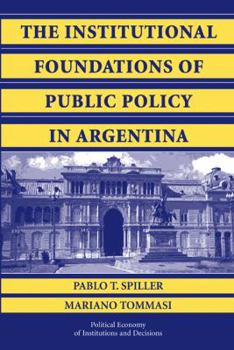The Institutional Foundations of Public Policy in Argentina
Select Format
Select Condition 
Book Overview
The authors have two purposes in this book, and they succeed admirably at both. They develop a general model of public policy making focused on the difficulties of securing intertemporal exchanges among politicians. They combine the tools of game theory with Williamson's transaction cost theory, North's institutional arguments, and contract theory to provide a general theory of public policy making in a comparative political economy setting. They also undertake a detailed study of Argentina, using statistical analyses on newly developed data to complement their nuanced account of institutions, rules, incentives and outcomes. Mariano Tommasi (Ph.D. in Economics, University of Chicago, 1991) is Professor of Economics at Universidad de San Andres in Argentina. He is past President (2004-2005) of the Latin American and Caribbean Economic Association. He has published articles in journals such as American Economic Review; American Journal of Political Science; American Political Science Review; Journal of Development Economic; Journal of Monetary Economics; International Economic Review; Economics and Politics; Journal of Law, Economics and Organization; Journal of Public Economic Theory; Journal of International Economics; and the Journal of Institutional and Theoretical Economics. He has held visiting positions in Economics, Business, and Political Science at Yale, Harvard, UCLA, Tel Aviv, and various Latin American universities. He has received various fellowships and awards, including a Guggenheim Fellowship in 2006. He has been an advisor to several Latin American governments and to international organizations such as the World Bank and the Inter-American Development Bank.
Format:Paperback
Language:English
ISBN:0521145783
ISBN13:9780521145787
Release Date:July 2009
Publisher:Cambridge University Press
Length:254 Pages
Weight:0.75 lbs.
Dimensions:0.7" x 5.9" x 8.9"
Customer Reviews
0 rating





